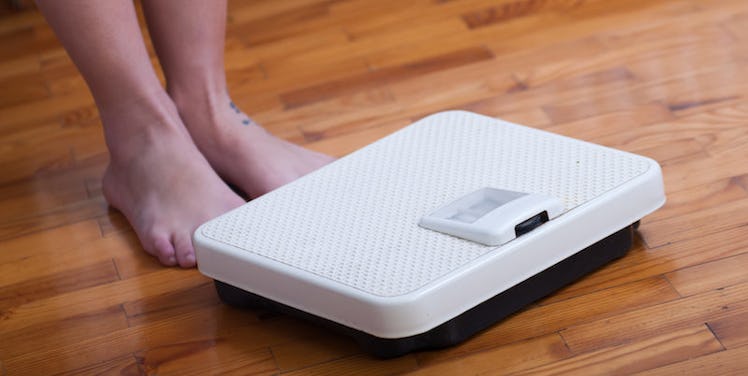
Stepping On A Scale Is The Worst Thing You Can Do For Your Mind And Body
I've always had a calculator in my head.
At first, it was harmless enough. I counted how many steps I took: seven from the garage door to the car, 18 between my second and third-period classroom doors. Twelve to my locker from Spanish class, 24 if I wanted to hit up my guidance counselor.
Then, at some point before senior prom, I started counting calories. Ninety for an apple. Nearly 300 for a slice of pizza. Best to go with steamed broccoli, that's only 55 calories and more filling than gooey, greasy cheese.
In college and throughout my relationship with a fitness-obsessed ex, I counted everything.
My life slowly became a never-ending math problem of how many calories made their way to my stomach and how quickly I was losing them. I was fixated on my goal weight of 120 pounds, though I was always double digits away from it. All my counting didn't matter.
I've stepped on scales at the doctor’s, at the place where I got laser liposuction, by accident. I always request they don’t tell me the number. I know looking down on the scale to see what that number is would be like looking down upon myself.
For the record, not weighing myself isn’t a stand against fat-shaming. Rather, it’s a stand against the calculator in my head — the one that still creeps up on me every so often after eating a particularly unhealthy meal.
The scale, like that mental calculator, will never be on my side -- and it's not because I suck at math.
A scale is only one number.
Ask any nutritionist or health psychologist, and they’ll tell you the number on a scale isn’t the byproduct of an unhealthy lifestyle or a result of not watching what you eat. It’s not an end goal.
When I first started losing weight, I didn’t need a scale to tell me so. After I spent my first week eating bare-bones dinners, I didn’t need the number to tell me I was being unhealthy. I didn’t need three digits to remind me I was lying about "eating a big breakfast" and “grabbing dinner at home."
I have no clue what my number is right now, but I know my V-necks look damn good.
More importantly, weighing yourself can become addictive.
There was a point in my life where I'd weigh myself every morning, then head to my school’s gym to weigh myself between classes. At night, I weighed myself after dinner.
The scale was my heroin and my god. It reassured me when my boyfriend wouldn’t, told me I was on the right path when my boyfriend would swipe the coffee from my hand and ask me if I knew how many calories were in my latte.
My favorite scale was the old-school one my grandmother brought back from Russia because, for some reason, kilograms were always nicer to me than pounds. It had a dial, which somehow felt more real than the digital kind.
I was convinced my ex would somehow program the battery-operated ones to add a couple more pounds to my weight, just to f*ck with me, just to remind me that no, whatever I was doing was not enough.
I was a paranoid mess, because of a number that bore no relation to my health, beauty or strength.
We learn to hate our bodies before we learn to love them.
According to a study by the University of Washington, over 53 percent of 13-year-old American girls are unhappy with their bodies. That number grows to 78 percent by the time they are 17.
That means that in less than 10 years, my four-year-old little sister is more likely to hate her tummy and her arms than love them. It means no matter how many times I call her beautiful, strong and smart, she will still find a way to hate the things that make her beautiful.
She will one day be held prisoner to a scale and stress over the way her hips jut out or her stomach rolls over the top of her jeans.
When she learns to count, she’ll use it to add up calories and miles. Just like her sister.
My body can’t be quantified.
My body, my thoroughly impressive body, cannot be measured by a goddamn number.
Looking back, I was in an emotionally malnourished relationship with both the scale and with my ex. The scale became an indicator for our happiness, one he manipulated to trap me in a cage held together by all the pounds I lost and gained.
His obsession with my weight wasn't okay and, while I know that now, I didn't realize it then. At the time, his attention seemed normal, seemed like he was trying to be protective. It was passed off as tough love, when it had all the bearings of a sh*tty relationship.
Eventually, that boyfriend and I broke up, and the calculator in my head slowly began to malfunction. It's been one-and-a-half years since we parted ways, and the same amount of time since I've weighed myself.
My body is not measured by how many times I say, "yes, I want a side of truffle fries with that burger, please." My body it's not quantified by how many miles it can run.
For the first time in a long, long time, the calculator in my head has had the batteries removed. I don’t care about counting anymore.